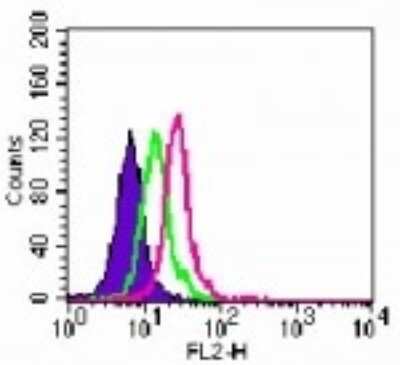TLR6 Mouse Monoclonal Antibody [Clone ID: 86B1153.2]
Frequently bought together (2)
Transient overexpression lysate of toll-like receptor 6 (TLR6)
USD 665.00
Other products for "TLR6"
Specifications
| Product Data | |
| Clone Name | 86B1153.2 |
| Applications | FC, IHC |
| Recommended Dilution | Immunohistochemistry-Paraffin: 5 ug/ml, Immunohistochemistry: 1:10-1:500, Flow Cytometry: 3 ug/10-6 cells, Flow (Intracellular), Flow (Cell Surface), Western Blot |
| Reactivities | Human |
| Host | Mouse |
| Isotype | IgG1 |
| Clonality | Monoclonal |
| Immunogen | This antibody was developed against a synthetic peptide corresponding to amino acids 408-424 of human TRL6. |
| Formulation | PBS containing 0.05% BSA, 0.05% Sodium Azide. Store at 4C short term. Aliquot and store at -20C long term. Avoid freeze-thaw cycles. |
| Concentration | lot specific |
| Purification | Protein G purified |
| Conjugation | Unconjugated |
| Storage | Store at -20°C as received. |
| Stability | Stable for 12 months from date of receipt. |
| Gene Name | toll like receptor 6 |
| Database Link | |
| Background | The Toll-like receptor (TLR) family in mammal comprises a family of transmembrane proteins characterized by multiple copies of leucine rich repeats in the extracellular domain and IL-1 receptor motif in the cytoplasmic domain. Like its counterparts in Drosophila, TLRs signal through adaptor molecules. The TRL family is a phylogenetically conserved mediator of innate immunity that is essential for microbial recognition. TLRs characterized so far activate the MyD88/interleukin-1 receptor-associated kinase (IRAK) signaling pathway. Ten human homologs of TLRs (TLR1-10) have been described. The amino acid sequence of human TLR6 is most similar to hTLR1 with 69% identity at the amino acid level. Human TLR6 consists of a predicted 807 amino acids with a molecular weight of approximately 92 kDa. Human and mouse TLR6 share an amino acid identity of 73%. TLR6 activates both NF-kB and c-Jun N-terminal Kinase (JNK). The amino acids in the cytoplasmic domain of IL-1 receptor, which are critical for NF-kB activation, are conserved in TLR6. It has also been shown that TLR2-mediated response to a phenol-soluble factor from staphylococcus epidermidis is enhanced by TLR6. TLR6 is predominantly expressed in spleen, thymus, ovary, and lung. |
| Synonyms | CD286 |
| Note | Immunohistochemistry-Paraffin and Flow cytometry/(Intracellular) |
| Reference Data | |
| Protein Families | Druggable Genome, Transmembrane |
| Protein Pathways | Toll-like receptor signaling pathway |
Documents
| Product Manuals |
| FAQs |
| SDS |
{0} Product Review(s)
0 Product Review(s)
Submit review
Be the first one to submit a review
Product Citations
*Delivery time may vary from web posted schedule. Occasional delays may occur due to unforeseen
complexities in the preparation of your product. International customers may expect an additional 1-2 weeks
in shipping.






























































































































































































































































 Germany
Germany
 Japan
Japan
 United Kingdom
United Kingdom
 China
China





